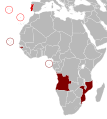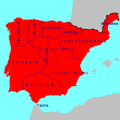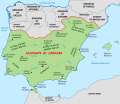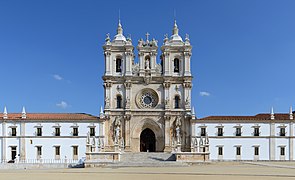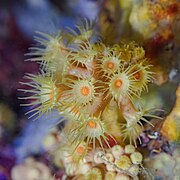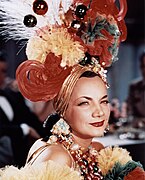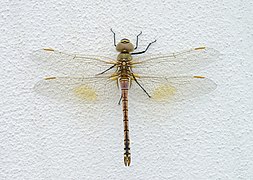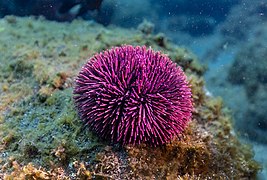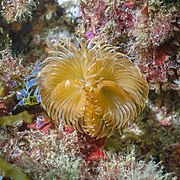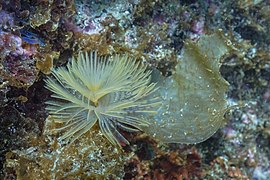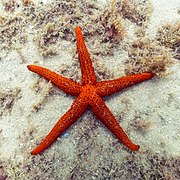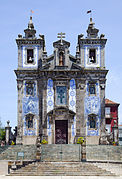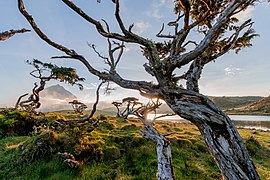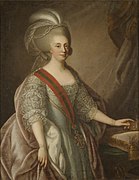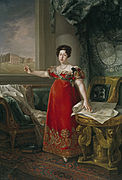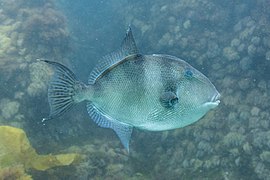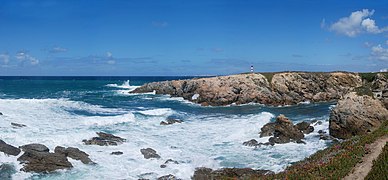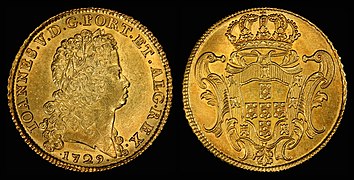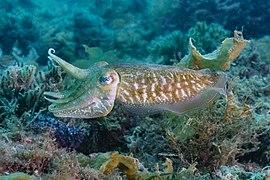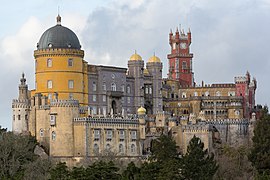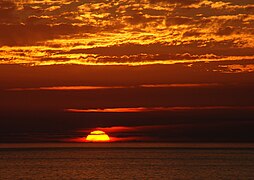Portal:Portugal
Welcome to the Portugal portal  Portugal, officially the Portuguese Republic, is a country in the Iberian Peninsula in Southwestern Europe. Featuring the westernmost point in continental Europe, Portugal borders Spain to its north and east, with which it shares the longest uninterrupted border in the European Union; to the south and the west is the North Atlantic Ocean; and to the west and southwest lie the Macaronesian archipelagos of the Azores and Madeira, which are two autonomous regions of Portugal. Lisbon is the capital and largest city, followed by Porto, which is the only other metropolitan area. The western part of the Iberian Peninsula has been continuously inhabited since prehistoric times, with the earliest signs of settlement dating to 5500 BC. Celtic and Iberian peoples arrived in the first millennium BC. The region came under Roman control in the second century BC, followed by a succession of Germanic peoples and the Alans from the fifth to eighth centuries AD. Muslims conquered the entirety of Portugal's current mainland in the eighth century, but they were gradually expelled by the Christian Reconquista over the next several centuries. Modern Portugal began taking shape during this period, initially as a county of the Christian Kingdom of León in 868, officially declared a sovereign Kingdom with the Treaty of Zamora in 1143. During the Age of Discovery, the Kingdom of Portugal settled Madeira and the Azores, and established itself as a major economic and political power, largely through its maritime empire, which extended mostly along the South Atlantic and Indian Ocean coasts. Portuguese explorers and merchants were instrumental in establishing trading posts and colonies that enabled control over spices and slave trades. While Portugal expanded its influence globally, its political and military power faced internal and external challenges towards the end of the 16th century. The dynastic crisis marked the beginning of the country's political decline that led to the Iberian Union (1580-1640), a period in which Portugal was united under Spanish rule. While maintaining a degree of self-governance, the union strained Portugal’s autonomy and drew it into conflicts with European powers which targeted Portuguese territories and trade routes. Portugal's prior opulence was further diminished by a series of events, such as the Portuguese Restoration War and the 1755 Lisbon earthquake, which destroyed the city and damaged the empire's economy. (Full article...) Selected article -Fort of Santa Cruz (Portuguese: Forte de Santa Cruz da Horta or Castelo da Santa Cruz), is a 16th-century fortification located in the civil parish of Angústias, municipality of Horta, on the island of Faial in the Portuguese Azores. Occasionally referred to as the Castelo de Santa Cruz by locals, it is situated in the historic centre of the city, on the edge of Horta Bay. It was constructed to work in conjunction with the Fort of Bom Jesus (Portuguese: Forte do Bom Jesus) at the mouth of the Ribeira da Conceição and Fort of Greta (Portuguese: Forte da Greta) along the coast of the extinct spatter cone Monte da Guia, to defend the entrance to the harbour and southern access to the Bay. (Full article...) This is a Featured article, which represents some of the best content on English Wikipedia.
Dom Pedro I (12 October 1798 – 24 September 1834) was the founder and first ruler of the Empire of Brazil, where he was known as "the Liberator". As King Dom Pedro IV, he reigned briefly over Portugal, where he also became known as "the Liberator" as well as "the Soldier King". Born in Lisbon, Pedro I was the fourth child of King Dom John VI of Portugal and Queen Carlota Joaquina, and thus a member of the House of Braganza. When the country was invaded by French troops in 1807, he and his family fled to Portugal's largest and wealthiest colony, Brazil. The outbreak of the Liberal Revolution of 1820 in Lisbon compelled Pedro I's father to return to Portugal in April 1821, leaving him to rule Brazil as regent. He had to deal with challenges from revolutionaries and insubordination by Portuguese troops, all of which he subdued. The Portuguese government's threat to revoke the political autonomy that Brazil had enjoyed since 1808 was met with widespread discontent in Brazil. Pedro I chose the Brazilian side and declared Brazil's independence from Portugal on 7 September 1822. On 12 October, he was acclaimed Brazilian emperor and by March 1824 had defeated all armies loyal to Portugal. A few months later, Pedro I crushed the short-lived Confederation of the Equator, a failed secession attempt by provincial rebels in Brazil's northeast. (Full article...) General imagesThe following are images from various Portugal-related articles on Wikipedia.
Selected quote -"Communism fundamentally distinguishes itself from fascism because it was the first."
O comunismo distingue-se fundamentalmente do fascismo porque foi o primeiro. This is a Good article, an article that meets a core set of high editorial standards.
António de Jesus (died c. 1722) was a Portuguese figure who flourished in late 17th and early 18th century Safavid Iran. Originally an Augustinian friar and missionary, he converted to Shia Islam during the early reign of Shah (King) Sultan Husayn (r. 1694–1722) and took the name Aliqoli Jadid-ol-Eslam. He subsequently became an apologist of Shi'ism as well as a major polemicist against Christianity, Sufism, Judaism, Sunnism, philosophers and antinomians. In addition, after conversion, he served as an official interpreter (also known as a dragoman) at the royal court in Isfahan. Aliqoli Jadid-ol-Eslam was one of the late 17th century converts in Iran who "helped reaffirm the Majlesi brand of conservatism". (Full article...) Selected Biography -António de Oliveira Salazar GCTE GCSE GColIH GCIC (28 April 1889 – 27 July 1970) was a Portuguese statesman, academic, and economist who served as Prime Minister of Portugal from 1932 to 1968. Having come to power under the Ditadura Nacional ("National Dictatorship"), he reframed the regime as the corporatist Estado Novo ("New State"), with himself as a dictator. The regime he created lasted until 1974, making it one of the longest-lived authoritarian regimes in modern Europe. A political economy professor at the University of Coimbra, Salazar entered public life as finance minister with the support of President Óscar Carmona after the 28 May 1926 coup d'état. The military of 1926 saw themselves as the guardians of the nation in the wake of the instability and perceived failure of the First Republic, but they had no idea how to address the critical challenges of the hour. Within one year, armed with special powers, Salazar balanced the budget and stabilised Portugal's currency. Salazar produced the first of many budgetary surpluses. He promoted civilian administration in the authoritarian regime when the politics of more and more countries were becoming militarised. Salazar's aim was the de-politicisation of society, rather than the mobilisation of the populace. (Full article...) Selected picture - A view of the 25 de Abril Bridge in Lisbon
Did you know -
Portugal topicsPortugal lists
SubcategoriesRecognized content
Featured articlesFormer featured articlesFeatured listsFormer featured listsGood articles
Former good articlesDid you know? articles
Featured pictures
Former featured portalsIn the News articles
Main page featured articles
Picture of the day pictures
Featured topicsNew articlesThis list was generated from these rules. Questions and feedback are always welcome! The search is being run daily with the most recent ~14 days of results. Note: Some articles may not be relevant to this project.
Rules | Match log | Results page (for watching) | Last updated: 2024-12-25 21:16 (UTC) Note: The list display can now be customized by each user. See List display personalization for details.
Things you can doRelated PortalsRelated WikiProjects
Associated WikimediaThe following Wikimedia Foundation sister projects provide more on this subject:
Discover Wikipedia using portals |



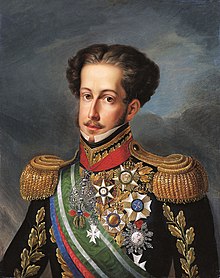



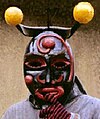






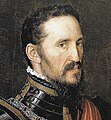



![Image 15Maios celebration in Madeira island [1] (from Culture of Portugal)](http://upload.wikimedia.org/wikipedia/commons/thumb/e/e1/2011-03-05_03-13_Madeira_045_Santana_%285543431418%29.jpg/120px-2011-03-05_03-13_Madeira_045_Santana_%285543431418%29.jpg)












